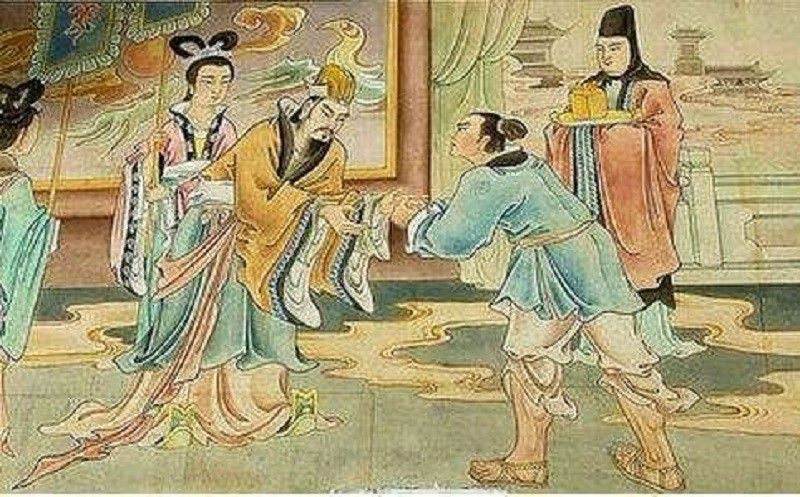Why didn't Dayu practice renunciation?
According to historical legends, in ancient China, there were two emperors with high morality, Yao and Shun; Yao Chuan is located in Shun, Shun Chuan is located in Yu. This mode of handover of power was later known as the Concession System. But further down, Yu did not give in, but handed over the throne after his death.
Confucianism praises the yearning for the concession system, and considers it to be the manifestation of the Datong society in which the world is the public. Confucius said, "It's so majestic, Shun and Yu have the world, so it's not worth it!" That means, "Wow, how great! Shun and Yu have the world, they didn't compete for it!" But Confucians couldn't explain why The cessation system cannot last forever. It can only be attributed to the fact that people are not ancient, and the emperors of later generations no longer have the high moral quality of Yao and Shun. And this explanation obviously contradicts their praise for Dayu.

Why is the cessation system so difficult to sustain? The fundamental reason lies in its inherent contradiction. The so-called "concession system" is defined from the extension as the "non-lifetime" and "non-hereditary system" of the handover of power. It will bring two major problems: one is the decentralization of power, and the other is the expansion of the rentier class. The former will lead to a decrease in the effectiveness of the rule, while the latter will lead to a decrease in the legitimacy of the rule.
Take Yao, Shun, and Yu as an example. Yao handed over power to Shun, and Shun handed over power to Shun, but the people are still alive, and there are still old ministries serving in the court and having great influence on the old ministries, so the old ministries are not necessarily so. Complete obedience to the successor. It is difficult for the successor's orders to be prohibited and unimpeded. This will create a decentralization of power, which will definitely affect the effectiveness of governance. If the successor wants to do something, he must first concentrate power, remove the old department that took office, and cultivate his own power. "Historical Records" records that after Shun took the throne, he exiled the "four evils" known as "Hunzhuan, Qiongqi, Tuo, and Taotie", all of whom were descendants of aristocratic clans; and appointed the so-called "Bakai" and "Eight Yuan". Dayu must have done something similar, but it can only be more than that.
Another one, Zen will increase the number of people who eat idle meals. After Yao and Shun abdicated, their treatment remained the same. They do not go out to hunt or farm, but their food is better than that of the common people, their food, clothing, shelter and transportation are better than that of the common people. When the common people see it, they will feel dissatisfied in their hearts. At that time, although the communication was very backward, the group was small and lived together, and the common people could see what the ruler did. This reduces the legitimacy of rule. Therefore, starting from the overall situation of maintaining the rule, the successor also has to clear the door. Otherwise, in the long run, the burden on the common people will become heavier and heavier, and if they can't bear it, the world will be in chaos, and in the end everyone will have nothing to eat.
Therefore, after the second renunciation, when Yu came to Yu, the dispersion of power and rent profits were quite serious. After Yu succeeded to the throne, he could not care about water control. The top priority was to centralize power and clean up the gates to improve the effectiveness of the rule and strengthen the legitimacy. The two complement each other and win the support of the common people. But in doing so, political trust is undermined. The reason why Yao was relieved to hand over power to Shun and the reason why Shun was relieved to hand over power to Yu was based on the premise of political trust, believing that his successor would not engage in liquidation. If they knew that their successors would be liquidated, they would definitely be reluctant to hand over power, no matter how noble their morals were. Na Yu's large-scale clean-up and political liquidation severely damaged political trust and made the cessation of renunciation unsustainable. Because he set a precedent and undermined political trust, he will save himself and give in himself. After handing over power, he will inevitably be liquidated by his successor. In this way, he is naturally reluctant to hand over power in his lifetime.
This is how the concession system was changed to lifetime and hereditary system. Its inherent contradiction makes it lack stability and cannot last for a long time. Concession presupposes political trust, but the resulting dispersion of power and the expansion of the rentier class endangers its rule, while the centralization of power and the reduction of rentiers in turn undermines political trust. For the rulers, the lifetime system is obviously better than the renunciation system, and it is safer and more effective; for the common people, the lifetime system is obviously better than the renunciation system. Just think about it, with the productivity level of ancient China, it is impossible to support many idlers. Of course, what I am talking about here is based on the premise of the authoritarian system of the past, which does not exist in constitutional democracy.
October 19, 2016
Like my work? Don't forget to support and clap, let me know that you are with me on the road of creation. Keep this enthusiasm together!

- Author
- More